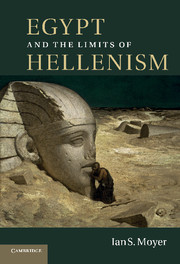Book contents
- Frontmatter
- Contents
- List of figures and table
- Acknowledgments
- Introduction: the absence of Egypt
- 1 Herodotus and an Egyptian mirage
- 2 Luculentissima fragmenta
- 3 The Delian Sarapis aretalogy and the politics of syncretism
- 4 Thessalos and the magic of empire
- Epilogue
- Appendix I Text and translation of the Delian Sarapis aretalogy (IG XI. 1299)
- Appendix II Translation of the Madrid manuscript of Thessalos, De virtutibus herbarum (Codex Matritensis Bibl. Nat. 4631)
- Appendix III Dating the composition of Thessalos, De virtutibus herbarum
- Bibliography
- Index
1 - Herodotus and an Egyptian mirage
Published online by Cambridge University Press: 05 July 2011
- Frontmatter
- Contents
- List of figures and table
- Acknowledgments
- Introduction: the absence of Egypt
- 1 Herodotus and an Egyptian mirage
- 2 Luculentissima fragmenta
- 3 The Delian Sarapis aretalogy and the politics of syncretism
- 4 Thessalos and the magic of empire
- Epilogue
- Appendix I Text and translation of the Delian Sarapis aretalogy (IG XI. 1299)
- Appendix II Translation of the Madrid manuscript of Thessalos, De virtutibus herbarum (Codex Matritensis Bibl. Nat. 4631)
- Appendix III Dating the composition of Thessalos, De virtutibus herbarum
- Bibliography
- Index
Summary
At some time near the end of the sixth century bce, Hecataeus of Miletus paid a visit to Egypt in the course of his extensive travels around the Mediterranean and the Black Sea. There, as Herodotus reports, the logographer and genealogist had a celebrated encounter with certain Theban priests. When Hecataeus recited his genealogy and traced his descent back to a god in the sixteenth generation, the Egyptian priests refuted the Greek's assertion of such recent divine ancestry by showing him 345 wooden statues, each set up by a high priest in his lifetime. The images represented an unbroken lineage of sons succeeding to their father's office, each of whom was a man not a god. Herodotus, too, claims he was shown these same images, though he had wisely refrained from reciting his genealogy.
This anecdote is the critical beginning of a Greek tradition on the knowledge of Egyptian priests – a knowledge which derives from the vast antiquity of Egyptian civilization, and is preserved through the records of a long-standing written culture. In this episode, Herodotus constructs a scene in which Greek traditions on the past are trumped by an Egyptian priest, vividly conveying the infancy of Greek civilization in the face of Egypt's great antiquity. This anecdote has also been critical in modern scholarly constructions of the relationship between Greek civilization and Egyptian. Some have seen it as a decisive moment in the intellectual biographies of the early Greek historians, others an attractive and useful fiction.
- Type
- Chapter
- Information
- Egypt and the Limits of Hellenism , pp. 42 - 83Publisher: Cambridge University PressPrint publication year: 2011



